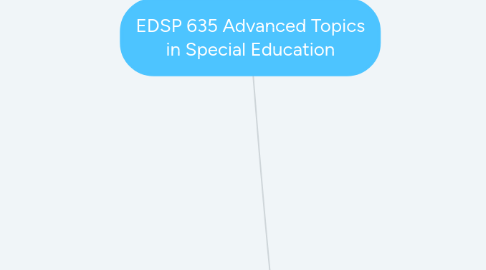
1. IDEA and Discipline
1.1. All children deserve safe and well-disciplined schools and learning environments.
1.2. Educators need the tools and resources to prevent misconduct and discipline problems.
1.2.1. Positive behavioral interventions and supports
1.3. The law seeks a balance between safe schools and provisions of FAPE.
1.3.1. Schools may discipline students with disabilities in the same way they discipline students without disabilities, with a few exemptions.
1.4. IEPS with behavior intervention can benefit students with discipline issues.
1.4.1. Discipline should be discussed through the IEP process.
2. Laws/Acts
2.1. IDEA
2.1.1. FAPE
2.1.2. Zero reject
2.1.3. Nondiscriminatory identification and evaluation
2.1.4. Least Restrictive Environment
2.1.5. Parent and student participation
2.1.6. Due process
2.2. No Child Left Behind
2.3. Every Student Succeeds Act
2.4. Education for All Handicapped Children Act
2.5. Americans with Disabilities Act
3. IEP Process
3.1. Pre-referral
3.1.1. Initial concern
3.1.2. Information gathering
3.1.3. Information sharing and team discussion
3.1.4. The student requires specially designed instruction
3.1.5. Discussion of possible strategies
3.1.6. Implementation and monitoring of strategies
3.1.7. Referral
3.1.7.1. Reasons for referral
3.1.7.1.1. Academic difficulties
3.1.7.1.2. Communication difficulties
3.1.7.1.3. Physical concerns
3.1.7.1.4. Abnormal behavior
3.2. Evaluation
3.2.1. Reasons for evalutation
3.2.1.1. Problems are longstanding and seem to increase in intensity and frequency
3.2.1.2. Interventions were not effective
3.2.1.3. Vision and hearing appear to be within limits
3.3. Eligibility
3.3.1. Criteria
3.3.1.1. Student has a diagnosed disability
3.3.1.2. The disability has an effect on educational performance
3.3.2. Process
3.3.2.1. Team meeting
3.3.2.2. Reviewing, reporting, and interpreting evaluation results
3.3.2.3. Determine eligibility and need for SPED
3.4. Evaluation and decision making
3.5. Definition of an IEP
3.5.1. A written document developed for each eligible student with a disability, between the ages of 3 and 21.
3.5.2. Individually designed program that includes special instruction, related services, assistive technology, and/or supplemental aids.
3.6. IEP Team
3.6.1. Parents of the child
3.6.2. General ed teacher
3.6.3. Special ed teacher
3.6.4. Rep. of public agency
3.6.5. Individual to interpret instructional implications of evaluation results
3.6.6. Child with the disability
3.6.7. Rep of other agencies who may be responsible for providing transportation services
3.6.8. Other individual who has knowledge or expertise regarding the child
